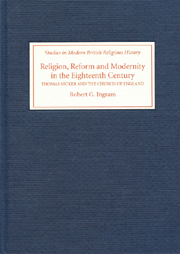
- Publisher:
- Boydell & Brewer
- Online publication date:
- September 2012
- Print publication year:
- 2007
- Online ISBN:
- 9781846155864
- Subjects:
- British History after 1450, History
Last updated 10th July 2024: Online ordering is currently unavailable due to technical issues. We apologise for any delays responding to customers while we resolve this. For further updates please visit our website https://www.cambridge.org/news-and-insights/technical-incident


A new interpretation of English history and religion in the eighteenth century. The eighteenth century has long divided critical opinion. Some contend that it witnessed the birth of the modern world, while others counter that England remained an ancient regime confessional state. This book takes issue with both positions, arguing that the former overstate the newness of the age and largely misdiagnose the causes of change, while the latter rightly point to the persistence of more traditional modes of thought and behaviour, but downplay the era's fundamental uncertainty and misplace the reasons for and the timeline of its passage. The overwhelming catalyst for change is here seen to be war, rather than long-term social and economic changes. Archbishop Thomas Secker [1693-1768], the Cranmer or Laud of his age, and the hitherto neglected church reforms he spearheaded, form the particular focus of the book; this is the first full archivally-based study of a crucial but frequently ignored figure. ROBERT G. INGRAM is Assistant Professor at the Department of History, Ohio University.
This work is soundly archivally based, but also draws together recent scholarship on mid-eighteenth-century theological questions in a form which is currently unavailable elsewhere. Ingram's scholarly and persuasive book is now the leading study of this wide and important field, and will need to be consulted by historians of modernisation and secularisation, as well as of the church.'
Source: English Historical Review
[This] fine scholarly volume [...] is far more than a biography and amountsto a careful analysis of the Church of England in the middle and later years of the 18th century. Dr Ingram has given us a first-class contextualised treatment of a highly-significant Georgian churchman and produced what will undoubtedly become the standard work on its subject. In doing so he has illuminated the political and ecclesiastical landscape in ways which place his readers heavily in his debt.'
Source: Parliamentary History
It is to be hoped that this well-written book, drawing on extensive reading in contemporary sources and demonstrating wide reading in the cultural, social and political history of the period, will be read by a wide audience. [.] This is an important contribution to eighteenth-century historiography.'
Source: Journal of Ecclesiastical History
 Loading metrics...
Loading metrics...
* Views captured on Cambridge Core between #date#. This data will be updated every 24 hours.
Usage data cannot currently be displayed.